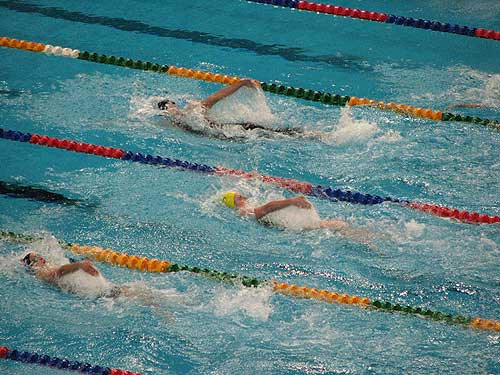 by Preston MacDougall August 17, 2008
The Attorney General, in something less than enforcer mode, recently said that "not every violation of the law is a crime". In that same semantic spirit, the most Olympic gold medals does not the greatest Olympian make. Perhaps? Certainly. But necessarily? No. Even among modern Olympians, there are athletes who have won gold in more than a single sport - sports being more general than events. Jesse Owens is a famous example, taking gold in running and jumping, in addition to Nazi humiliation.  Credit: morguefile.com
But to stretch credulity even more than Michael Mukasey, what about the superhuman Twelve Olympians of the Greek pantheon? I hear that Poseidon was quite a swimmer. To get back to great accomplishments of American humans, why should the term "Olympian" be automatically restricted to athletic events? Milo himself was a devoted follower of the Greek philosopher and mathematician Pythagorus. Milo once used his great strength to save his teacher and fellow students from a falling hypotenuse when the roof of their meeting hall collapsed. Chemistry also has a role to play in the evaluation of "great Olympians". And not just in erasing this title with artificial steroid detecting technology, as recently happened to Marion Jones, who was stripped of all five of her Olympic medals from the 2000 games in Sydney in the wake of the BALCO steroid investigations. BALCO was built around the synthetic steroids that were designed and created by a body-building organic chemist who knew how to get around sporting regulations as well as the crude analytical methods then used for urine analysis. Patrick Arnold may or may not have committed a crime in the Mukasey sense, but he definitely lacked the Olympian spirit, and was sentenced to three months in a federal prison. Other chemists fully partake of the Olympic spirit each year during the annual International Chemistry Olympiad. Modeled after secondary school Chemistry Olympiads in the Soviet Union, the first International Chemistry Olympiad was held in Prague in 1968, most appropriately during the brief period of political liberalization known as the Prague Spring. This inspiring event, which includes tests of both theoretical and practical skill, has grown to include over 200 high school students from 66 countries. In July of this year, the 40th Olympiad was held in Budapest, Hungary, and the four-member teams from China and Russia each earned solid gold. Yongping Fu, from China, earned the top individual score, but he wasn't perfect. The first person to ever earn a perfect score at the Chemistry Olympiad was Sean Kedrowski in 2000, then a junior from the Baylor School in Chattanooga, Tennessee. Sean again represented his country in his senior year of high school, and won another gold medal in 2001. Another student from Chattanooga, Eric Brown, also represented his country at the Chemistry Olympiad in back-to-back years (2003 and 2004), earning a silver medal each time. Perhaps there's something in the water in Chattanooga, because both Sean and Eric were swimmers for their school teams, with Eric winning five state titles. Sean went to Duke, where he won the top award for chemistry majors, and is currently working on his PhD at CalTech, studying ion channels and their role in a variety of diseases. Whether they push the limits
of swimming in lanes themselves, or perfect techniques to study
essential nutrients doing it at the molecular level, my hat is
off to each of these "great Olympians".
On the Web:
E-mail your letters & opinions to editor@sitnews.us SitNews ©2008 Stories In The News Ketchikan, Alaska |